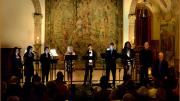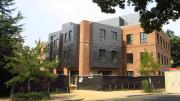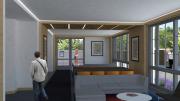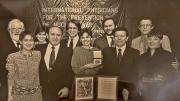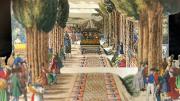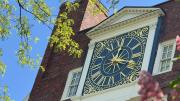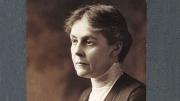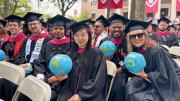The music of Roomful of Teeth, the Grammy-winning vocal ensemble who performed at Dumbarton Oaks Research Library and Collection on Sunday, serves as perhaps an apt metaphor for how discrete disciplines come together at the University’s Washington, D.C.- based center for the humanities. The diverse sounds of yodeling, Tuvan and Inuit throat singing, and more familiar styles of belting reverberated off the medieval tapestries that line the music room’s ornate walls. “Exploring these old singing traditions, but bringing them together in new creations, is much of the core of Roomful of Teeth,” the group’s founder and director Brad Wells explained in a behind-the-scenes session that kicked off a marathon day of revelry.
Much the same can be said of Dumbarton Oaks as it celebrated a season of progress in its efforts to foster links among the often disconnected scholars of Byzantine, Pre-Columbian, and garden and landscape studies who come there to work (see “Home of the Humanities,” May-June 2008). Sunday’s festivities marked several significant expansions for Dumbarton Oaks, which heads into its seventy-fifth-anniversary year in 2015: the completion of renovations to a newly purchased apartment building for its visiting fellows; a new program in urban landscape studies, including fellowships and public programming, funded by the Andrew W. Mellon Foundation; and the inauguration of a residency for early-career musicians, whose first recipient is Pulitzer-winning composer and Roomful of Teeth member Caroline Shaw.
“Adaptability to change is not a quality for which the humanities and universities are supposed to be particularly receptive,” Porter professor of medieval Latin Jan Ziolkowski, the director of Dumbarton Oaks since 2007, explained to the audience in a speech before the evening’s concert. But as funding and support for the arts and humanities have evaporated, he continued, Dumbarton Oaks has had to adapt, finding new ways to reinvent and reinvest in its original mission. “We here have embraced it, but in our own style and on our own terms. The results, in my view, have been spectacular.”
The biggest of these strides comes in the form of the nearly completed Fellowship House, an overhauled apartment building with spaces for 26 resident fellows at 1700 Wisconsin Avenue, a short block from the museum’s main entrance. Dumbarton Oaks purchased the property in 2011; renovations began in 2013 to transform the Eisenhower-era office structure into a high-tech, sustainable apartment building that is expected to achieve LEED Gold status (as reported in Brevia, November-December 2011, page 59).
On Sunday afternoon, celebrants—who included Harvard faculty and staff members visiting from Cambridge, as well as members of the local music and architecture communities—got a preview of the new building, which was designed by architects from Cunningham/Quill. Visitors wandered through the quiet studio, one-, and two-bedroom apartments, stepping around kitchen appliances still to be connected before the early-November move-in date. The building includes a soundproof, state-of-the-art practice room for the resident musician, as well as gathering spaces for conferences and presentations—currently impossible in the over-programmed apartment building a half-mile from the main campus where fellows currently live.
Still to be installed are a number of elements that will further connect the new building to the main campus, including simulcast capabilities, photographs curated from the museum’s collection, and a “vertical garden.” Overall, the new space will foster more casual encounters among the center’s diverse visiting fellows, and Ziolkowski says this is where the real power of time at Dumbarton Oaks will come. “I want them to have a year of quiet, I want them to love the serenity and the beauty and have the chance to hunker down,” he explained in an interview. “But the fact is that we could just send checks to people where they are, if there wasn’t some further goal. And the further goal is to get them to grow through exchange.”
Adding to that exchange will be the two new fellowship programs celebrated on Sunday evening, each of which is uniquely tied to the institution’s efforts to bring its original mission into the twenty-first century. Charged with maintaining the estate of Robert Woods Bliss, A.B. 1900, and Mildred Barnes Bliss and serving as a center for Byzantine studies, Dumbarton Oaks added fellowship programs in pre-Columbian and garden and landscape studies a quarter-century after the Blisses’ donation to Harvard. The new fellowship in urban landscape studies, which director of garden and landscape studies John Beardsley highlighted at a reception before the concert, will tie Dumbarton Oaks to dominant conversations in design today, and, by bringing historians and designers together, help further “integrate the design disciplines with the humanities,” he said.
The residency program for early-career musicians builds on the Blisses’ separate interest in music, and further links it to the intellectual life of the institution. The Friends of Music series, inaugurated in 1946 and continued in a series of seven paired concerts that run through each academic year, has had little formal interaction with either contemporary music or the fellowship program. Sunday’s Roomful of Teeth concert highlights just how much this is beginning to change. Caroline Shaw’s Partita for 8 Voices, for which she became the youngest-ever winner of the Pulitzer Prize for Music last year, began the evening’s program. Trained as a violinist and currently a doctoral candidate in composition at Princeton, Shaw spent a year after college traveling around Europe studying formal gardens, a topic clearly close to Dumbarton Oaks’ institutional heart. Perhaps, Ziolkowski reflected, “the perfect candidate.”
The excitement of renewed programming and renovated spaces can already be felt. “My charges, the Pre-Columbian fellows, are quite often coming fresh from the field, they’re coming from working in remote sites in isolated locations,” program director Colin McEwan reflected. “And the sense of community at D.O. is palpable. And for someone like Caroline to meet with them is bringing worlds that are far apart together.”
